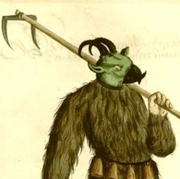- twoday
- May 4, 2005
-


C-SPAM Times best-selling author
|
From an article titled "Some Genial Old Drinking Customs" by Marie Kimball. The whole thing is a pretty good read, but here is a highlight:
quote:
From the time of the first settlement the Virginian had believed in his "morning draught." It was an agreeable supposition that this would serve as a protection against all rigors of climate, whether in the Tidewater or the Piedmont. Indeed, if we may believe the words of a contemporary poet, protection or fortification was necessary at frequent intervals during the day:
The cordial drop, the morning dram, I sing.
The mid day toddy, and the evening sling.
The julep early sprang into first place as desirable for an "eye opener." In 1787 the American Museum states, "the ordinary Virginian arises about six o'clock. He drinks a julep made of rum, water and sugar, but very strong." To this, in 1802, the Newport Mercury complacently replied: "Their breakfasts in New England are not of whiskey juleps, nor of gin sling, but of tea and coffee." We can imagine what would have been the good Rhode Islander's sentiments on visiting a plantation, when the little Negro arrived with a third mint julep and remarked: "Better take dis, boss, it am de last yo' all git befo' breakfast."
The morning draught was not confined to the South, however, nor to men. In 1733 the Pennsylvania Gazette took the women of Philadelphia to task for indulging in this habit: "It is now become the practice of some otherwise discreet women, instead of a draught of beer and toast, or a chunk of bread and cheese, or a wooden noggin of good porridge and bread, as our good old English custom is, or milk and bread boiled, or tea and bread and butter, or milk, coffee etc, they must have two or three drains in the morning, by which their appetite for wholesome food is taken away, and their minds stupefied. Though there be no bread in the house, and the children almost barefoot this cold weather, yet, as if drinking rum were part of their religious worship, they never fail their constant daily sacrifice."
It was in Georgia, however, that drinking was apparently done to the Queen's taste. A gentleman of Savannah might be tempted to spend his day in this agreeable manner: "If I take a settler after my coffee, a cooler at nine, a bracer at ten, a whetter at eleven, and two or three stiffeners during the forenoon, who has a right to complain?"
It remained for an Englishman, Lieutenant Anburey of His Majesty's forces, to describe a perfect day in Virginia in 1779. "The planter rises about eight o'clock," he tells us, "drinks what he calls a julep, which is a large glass of rum, sweetened with sugar, and then walks, or more generally rides round his plantation, views his stock, inspects his crops, and returns about ten o'clock to breakfast on cold meat, or ham, fried hominy, toast and cyder; tea and coffee is seldom tasted, but by the women. He then saunters about the house, sometimes amusing himself with the little negroes who are playing round the door, or else scraping on a fiddle. About twelve or one he drinks toddy, to create him an appetite for dinner, which he sits down to at two o'clock. After he has dined he generally lays down on the bed, and rises about five, then perhaps sips some tea with his wife, but commonly drinks toddy until bed-time; during all this he is neither drunk nor sober, but in a state of stupefaction."
The julep, the toddy, punch and grog followed the early American from the cradle to the grave. Every occasion, from his christening to his funeral was gaily seized upon as an excellent excuse for a "nip." The Puritans of New England and the planters of the South, whatever their other views, were united in these pleasant and time-honoured customs. We tend to think of weddings as occasions for feasting and celebrating; apparently they were nothing compared to an old fashioned funeral. The Reverend William Bentley of Salem tells us that "a prayer was made at the house, after which a dram of New England rum was regularly distributed to each person of every age and of each sex, then another prayer and dram, and then the funeral procession."
 
|
 #
¿
Aug 9, 2013 11:46
#
¿
Aug 9, 2013 11:46
|
|
- Adbot
-
ADBOT LOVES YOU
|

|
|
#
¿
May 6, 2024 03:28
|
|







